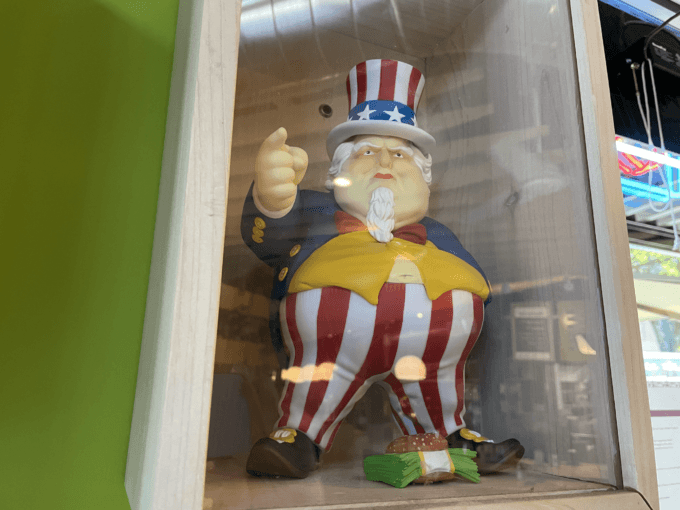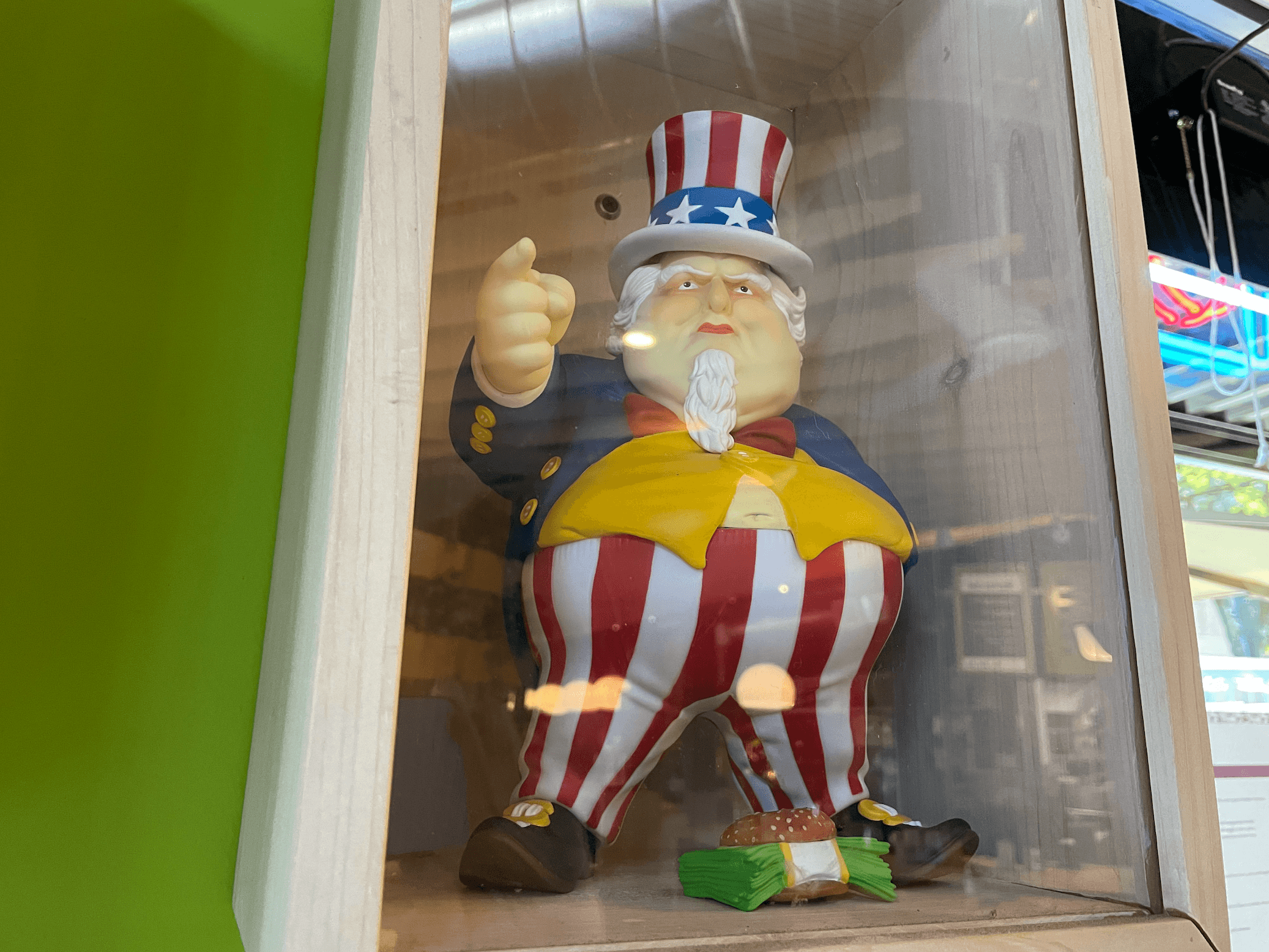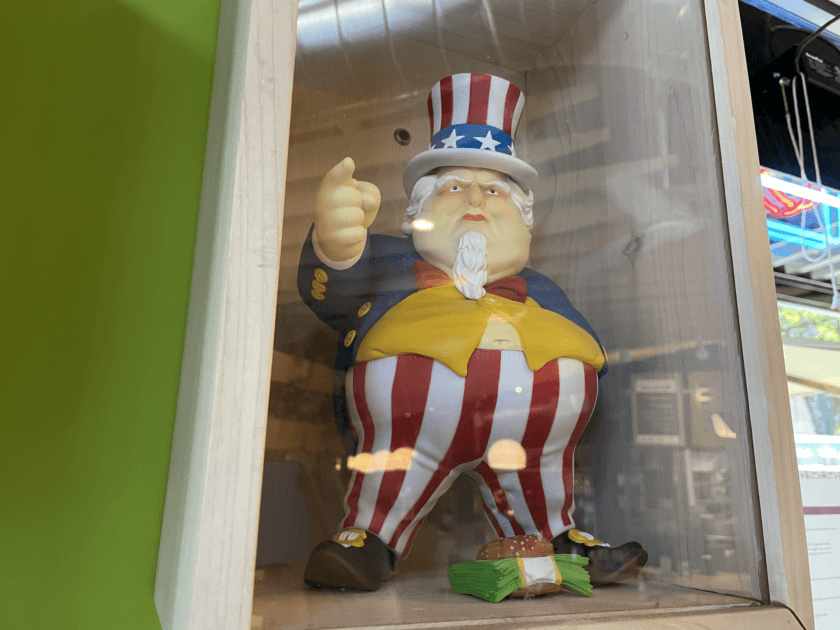






























































Photograph by Nathaniel St. Clair
“Man is what he eats,” (“Der Mensch ist was er isst“) is a well-known pun in German on ist (to be) and isst (to eat) from the 19th century German philosopher Ludwig Feuerbach. More than a pun in German, it is an excellent short summary of Feuerbach’s material criticism of Christianity. Today’s front-page radar on President Trump’s on-and-off global tariff impositions is decidedly materialistic. Over 70 leaders from around the world are vying to come to Washington to see how they can get their country’s tariffs lowered. Materialism reigns; the world is playing Trump’s transactional game.
But what about Trump’s disrespect for human rights, the rule of law and separation of powers as well as his gutting foreign assistance? Beyond the kerfuffle about tariffs and trade balances, will any of the state leaders negotiating with Washington speak truth to power and admonish Trump’s autocratic rejection of liberal values? (Negotiating with China’s Xi Jinping is a similar experience. How many leaders mention human rights when negotiating business deals in Beijing?)
As an example: What could Switzerland do when negotiating with Trump? The Swiss are always defending the importance of the rule of law and consider Geneva the world’s center of human rights. But they have said very little when their Sister Republic welcomed Israeli Prime Minister Benjamin Netanyahu to the White House, Netanyahu who is under an arrest warrant by the International Criminal Court.
Furthermore, what about the Swiss defending multilateralism in general and International Geneva in particular with the U.S.? The World Trade Organization (WTO) is based in Geneva. Will the Swiss remind Trump of the U.S.’s legal WTO commitments? In the face of Trump’s proposed tariff violations of WTO rules, the Swiss, Singapore and 34 other countries issued a declaration that reaffirmed “our collective commitment to the principles of the WTO and to maintaining open trade is more crucial than ever” and deplored “the rise of protectionism” without specifically mentioning the United States. When negotiating tariffs, will the Swiss argue for a U.S. commitment to WTO tariff rules and push the U.S. to deblock the deadlock over appointments to the WTO’s Appellate Body?
Second, the rules of humanitarian law are being egregiously violated, and not just by Israel. The Swiss Federal Council established a task force to develop a strategy to counter the announced 31% Trump tariff imposition. Why not establish a task force to defend IHL in the face of flagrant violations since Switzerland is the depositary state of the Geneva Conventions, the foundation of International Humanitarian Law (IHL)? Common Article 1 of the 1949 Geneva Conventions says that States Parties to the Conventions undertake to “respect and ensure respect” for the Conventions. Shouldn’t the Swiss and other countries lobbying for lower tariffs also lobby for ensuring respect for IHL?
More generally, Trump and Company have no respect for the international rule of law which is a bedrock of Swiss foreign policy. “The work of international bodies such as the Human Rights Council, the International Criminal Court and the various U.N. investigation and fact-finding mechanisms is of great importance,” Swiss Foreign Minister Ignazio Cassis stressed at the U.N. Security Council in November 2023. “It is crucial that all states, as well as the Security Council, cooperate fully with these bodies” he stated. “Switzerland will work towards further strengthening rule of law during its tenure in the Security Council,” he added.
Will any of this be brought up when the Swiss discuss tariffs with American representatives? Swiss companies, like the pharmaceutical giant Novartis, have promised to invest more in the U.S. – $23 billion over five years – in order to lower the tariff proposed. Are the only discussions between Switzerland and the U.S. about money and how much more Switzerland will invest in the United States?
During the writing of the Declaration of Independence, legend has it that Thomas Jefferson changed the unalienable rights in the Preamble from “Life, Liberty and Property” to “Life, liberty and the pursuit of Happiness” because of his familiarity with the Genevan philosopher Jean-Jacques Burlamaqui. If man is more than what he eats and the pursuit of happiness is an unalienable right, there must be more to negotiate with the United States than just property and tariffs.
To return to Feuerbach: There was also more than basic materialism in Feuerbach’s message. In arguing for man’s responsibility for himself instead of some otherworldly being, Feuerbach set the stage for radical political action. As he wrote, “It is a question today…not whether we are Christians or heathens, theists or atheists, but whether we are or can become men, healthy in soul and body, free, active and full of vitality.” (Feuerbach’s attacks on religion laid the framework for revolutionary political actions and strongly influenced Karl Marx. See Marx’s 1845 “Theses on Feuerbach”)
Recently, at a rally in Los Angeles on the Fight Oligarchy tour, Senator Bernie Sanders also stated that there were issues with Trump beyond economic materialism; “When we talk about oligarchy, it is not just economics,” he told 36,000 enthusiastic listeners. He went on to describe the corrupt Trump administration and how the system now bends towards greed and violations of the rule of law; “We are fighting a president who undermines our Constitution every day and threatens our freedom of speech and assembly,” Sanders shouted to the cheering crowd.
The kerfuffle over tariffs is necessary; an international trade war will have dire global consequences. But it is not sufficient. Caving in to Trump’s outlandish economic demands will not change the downward spiral of his assault on liberal values. The leaders speaking to Trump to lower his tariffs – especially the Swiss with their traditional role in human rights, humanitarian law and multilateralism – cannot, should not forget values other than economic materialism. Instead of caving in to Trump’s transactional paradigm, they must speak truth to power about non-material values and norms.
The post Tariffs Kerfuffle: Man is More Than What He Eats appeared first on CounterPunch.org.
This content originally appeared on CounterPunch.org and was authored by Daniel Warner.